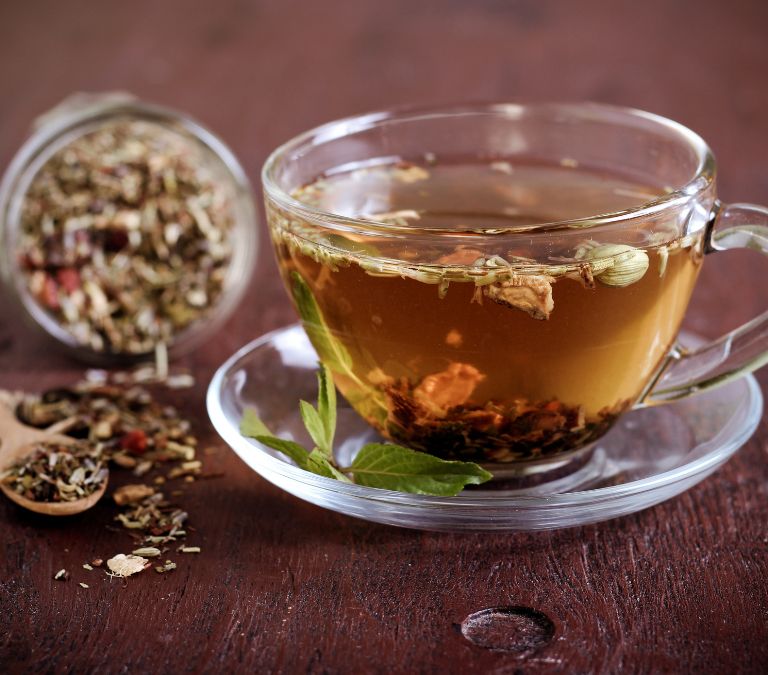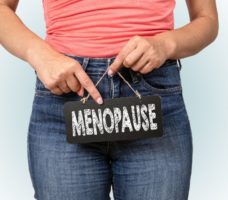Menopause refers to the absence of menstrual cycles for 12 consecutive months. You will also notice a slow decline in hormone production—the balance of estrogen, progesterone, and testosterone hormones changes during menopause.
Perimenopause refers to the period just before menopause. It brings with it symptoms such as hot flashes and mood changes. These symptoms begin to disappear after menopause. Perimenopause symptoms usually start in the 40s and 50s. However, it can also occur earlier.
Perimenopause can be natural, lasts anywhere from 10 to 4 years, and may last longer for some. Hot flashes, mood swings, and dryness may accompany vaginal bleeding, dryness, and weight gain. Your risk of developing osteoporosis may be higher.
If you are going through menopause or perimenopause, there may be natural ways to ease your discomfort and pain. For example, some teas might be able to help you with your symptoms. Continue reading to find out more about teas to relieve menopause!
The Importance of Herbal Teas for Menopause
Women have used herbal teas for centuries to manage their menopause symptoms and improve their quality of life. You can use herbs to treat symptoms such as hot flashes and night sweats, mood swings, insomnia, vaginal dryness, sleeplessness, mood changes, fatigue, sexual dysfunction, hot flashes, night shivers, and mood swings.
Some of the long-standing traditions of herbal use in menopause are supported by scientific evidence. However, more research is needed to determine if herbal remedies for menopausal symptoms are safe and effective.
Each culture around the globe has used healing plants to create their medicines at one time or another. Many parts of plants are useful for medicinal herbs, including leaves, seeds, roots, and flowers.
Black cohosh (or Dong Quai) and Ginseng are some herbs used to treat menopausal symptoms. In addition, some herbs, like Tribulus, maca, and horny go weed, are better suited for low sex drive (libido). In contrast, herbal teas like lemon balm and valerian help manage anxiety, stress, insomnia, and fatigue.
You can dry herbs or herb mixtures and make teas by boiling water. Or you can concentrate alcohol in water to make tinctures, extracts, or tablets. You can also use herbs externally to treat skin conditions.
Top 7 Teas that Will Help with Perimenopause and Menopause Symptoms
Menopause commences at the moment of seeing the last menstruation twelve months back. In North America, the average age to attain menopause is 51.4. Typically, menopause occurs for seven years for women between 40 – 50 years.
Women have different encounters with menopause. Some women experience no sign of menopause, while others experience mood swings, emotional and physical upheavals, etc., at different levels. However, tea is beneficial to help out with the transition to menopause, especially regarding the symptoms.
This tea has powerful effects to relieve your menopausal symptoms regardless of the type you may be experiencing. Here is a list of these teas and their health benefits for menopause;
Licorice Tea
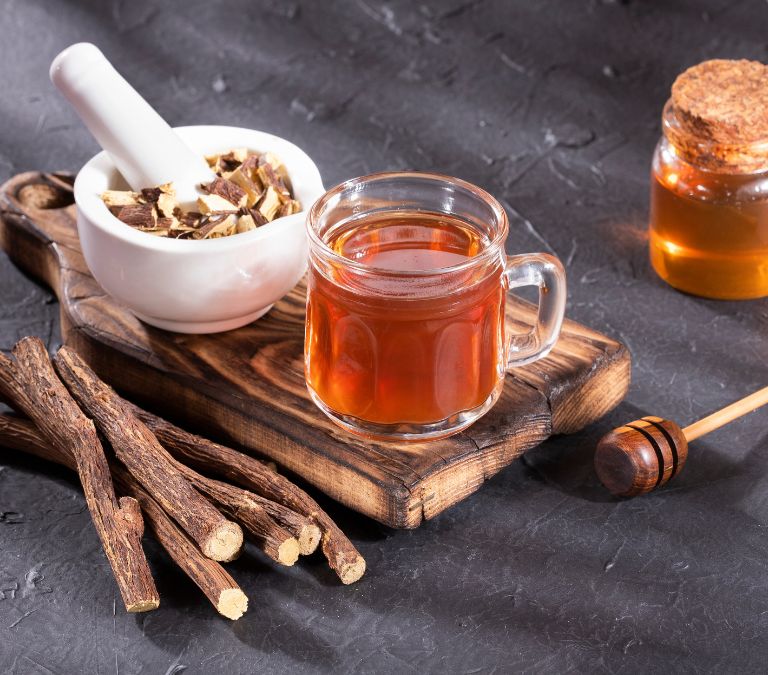
This tea is a preferred choice whenever you are urged to take a sugar-filled meal. It has a bit of a sweet taste and has high phytoestrogen and plant-based estrogen. This tea can cause a balance if your body shows symptoms of low estrogen.
This tea significantly reduces hot flashes for women becoming menopausal and how long they experience it. It is rich in estrogen and can reduce respiratory issues and stress.
Melinda McDougall, a famous medical herbalist, utilizes licorice in tiny doses to alleviate the stress associated with menopause. It also helps boost healthy cortisol levels and balances hormones, excluding high blood pressure patients.
Licorice tea helps in causing relaxation, which is a good option at night, especially since menopause causes stress for many. It is rich in properties that help in supporting your nervous system. Add a tiny portion of honey and crush fennel seeds over boiling water to aid digestion. Add peppermint tea as it helps digestion.
However, it is essential to note that Liquorice tea harms users if not taken appropriately. You must consult your doctor before commencing consumption.
Ginger Tea
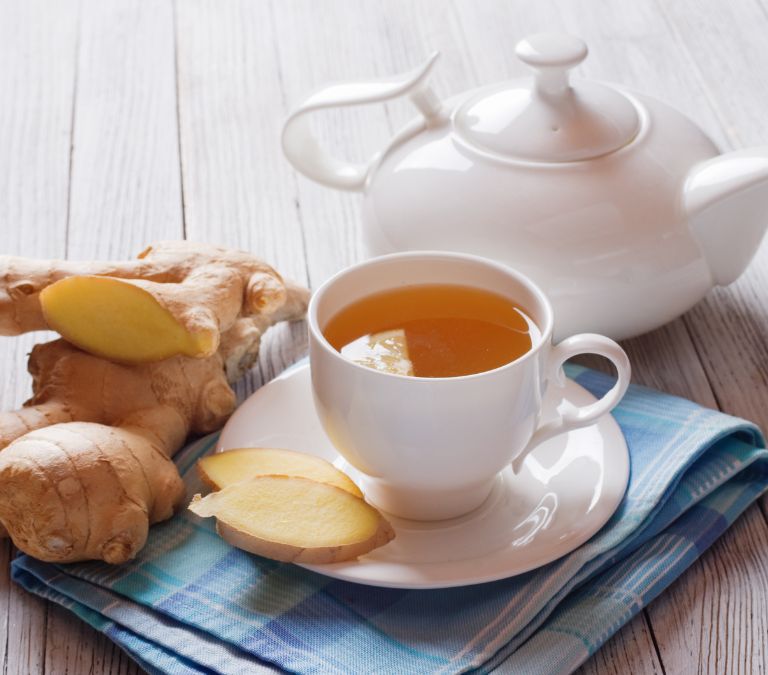
This tea is an excellent choice to aid digestion and reduce menopausal symptoms such as vomiting, stomach upset, etc. Other symptoms it helps with are anxiety, stress, and indigestion because they have anti-inflammatory functions. The health benefits of ginger tea are plenty. Ginger tea helps reduce pains and aches in the joint and is an excellent choice for a cold day.
Making ginger tea is easy as you can get fresh ginger and grate, chop, or peel it and add it to the desired simmer pan to allow simmer for 10-15 minutes. You can add a small portion of honey or a squeeze of honey when taking it.
Green Tea
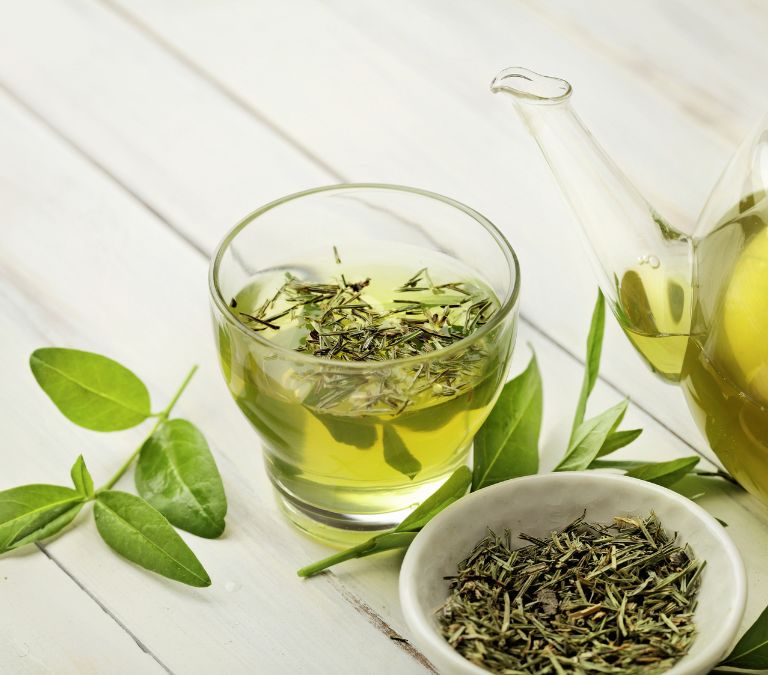
If you are looking for a drink with caffeine, this is an excellent choice for you. It has the effect of making you feel at ease after taking it. According to a study carried out in 2009, green tea is excellent for improving the strength of bone metabolism. It also helps reduce bone fractures, including for menopausal women and those with a family osteoporosis history.
It has antioxidants such as epigallocatechin gallate, which causes smooth aging. Green tea also has EGCG, reducing inflammation, enhancing weight loss, and protecting the heart and brain from diseases. Also, it improves metabolism, which ensures the weight gain associated with menopause is controlled.
Green tea has various flavorings with a blend of other ingredients with minimal risk. It is an excellent option for menopausal women.
Rooibos Tea
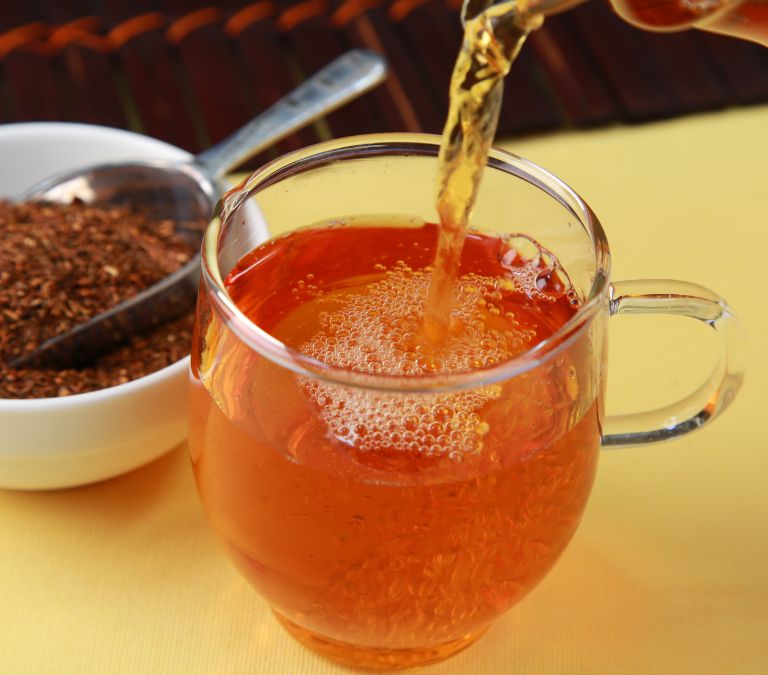
The Rooibos tea is rich in vitamin c and minerals, making it an excellent menopausal tea due to its health benefits. It is a simple tea with no caffeine and delicious with milk. It has tannins, a natural compound in black and green teas, but the tannin levels are lower than in black or green tea. However, many do not prefer this tea because it interferes with critical menopausal nutrients such as iron.
This tea is effective in preventing diseases and any signs of aging. It has good health properties such as antioxidants, reducing any chance of weight gain. Also, it aids blood sugar regulation, which helps prevent type 2 diabetes.
Rooibos tea has quercetin, an antioxidant that strengthens the heart, lowers the chance of some cancers, fights viruses, and contains anti-inflammatory properties that reduce heart disorders.
People more prone to heart diseases benefit the most from this tea because it has antioxidant properties. According to a report, it reduces blood pressure, improves cholesterol levels, and decreases LDL cholesterol which is bad for the body. In addition, it increases HDL cholesterol, which is good for the body.
It is available in supermarkets but can easily be made using tea bags, lemon, sugar, and mint.
Ginseng Tea
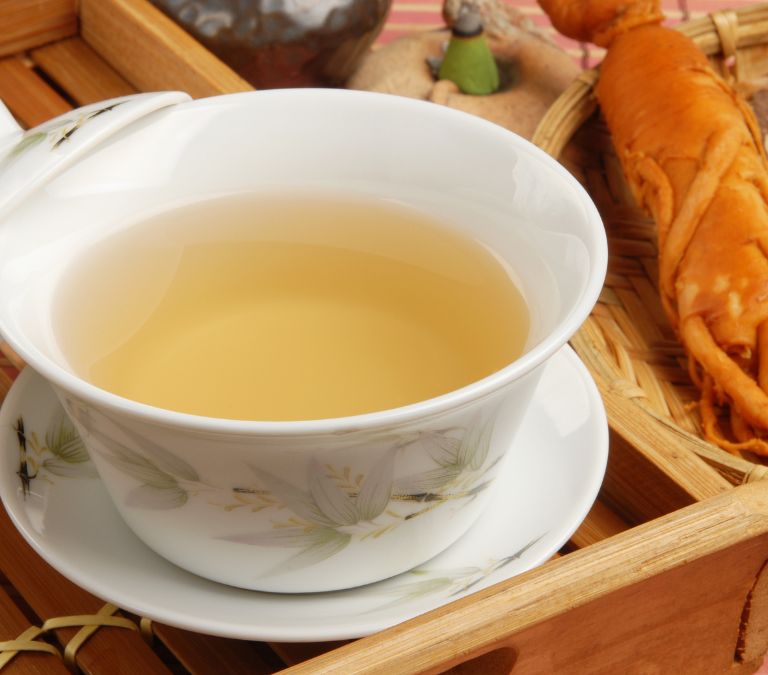
It is a good recommendation for menopausal women who mostly suffers from hot flashes and night sweats. It also limits the chances of acquiring cardiovascular disease in post-menopause. According to a 2010 study, this tea is essential for improving menopausal women’s sexual urges.
Ginseng tea is not cheap and should be avoided by individuals who take prescribed medications for diabetes, blood pressure, etc.
Sage Tea
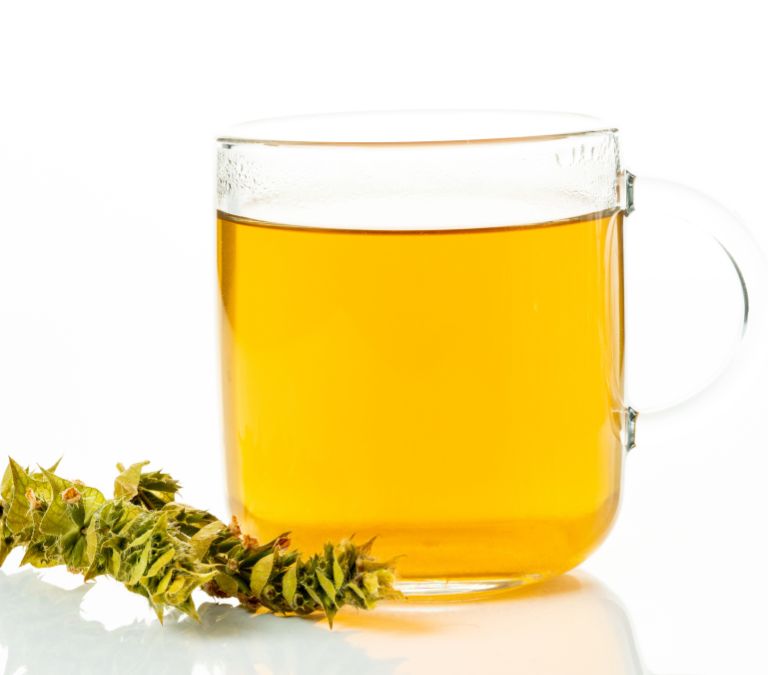
One of the essential properties this tea has is antioxidant compounds. This property makes this tea a good option for common health challenges in menopausal women and reduces weight loss, hot flashes, and night sweats. Sage tea acts like estrogen in the body for hot flushes, which may not work for all. One or two cups of Sage tea is beneficial to resolve minor flushes.
It is essential to occasionally drink sage tea because it boosts one’s health by ensuring hydration and antioxidant level. However, please do not take more than the average dose of sage tea because it contains oils such as camphor and thujone. These oils may harm individuals who take them excessively by the oral method. To be on the safe side, sipping between three to six cups of sage tea is safe to consume daily.
It is simple to make sage tea. Put two tablespoons of fresh typical sage leaves or one tablespoon of dried leaves into a mug. Next, fill the cup with almost boiling water and cover for about three minutes. Afterward, strain the tea to remove the leaves.
This tea is either purchased online or in natural health stores. It is also available in various tea blends.
Nettle Tea
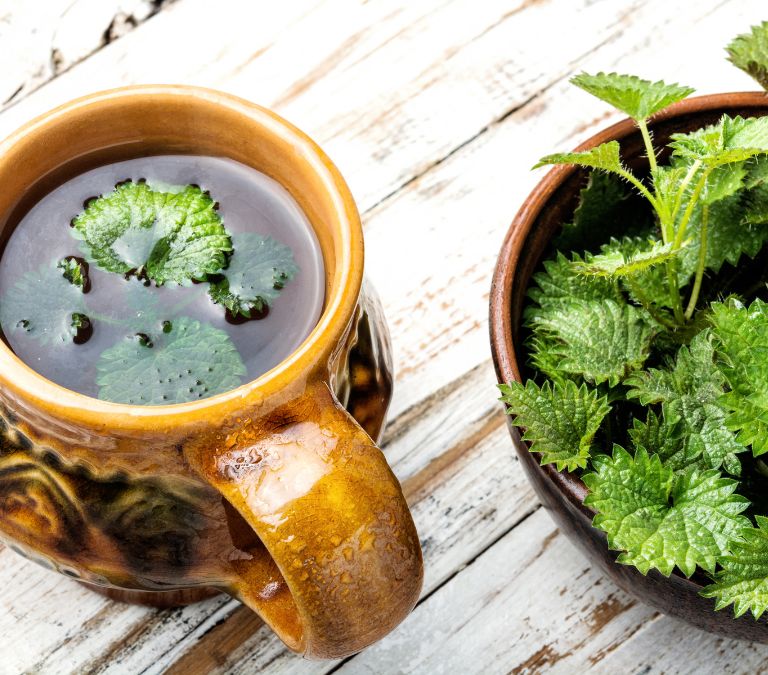
Nettle is a powerhouse plant with good benefits because it is a natural antihistamine. It helps curb menopausal symptoms such as itchy and irritable skin, inflammation, and achy joints.
This tea cleanses the blood perfectly as it possesses alkalizing benefits. For women who experience breast tenderness or hardness during specific monthly periods, it helps to flush things, incredibly if drunk daily easily.
The stinging Nettle tea aids in preventing pro-inflammatory pathways linked to allergic rhinitis, which is hay fever. Pluck a bunch of the new tops off the spring plants while wearing gloves. Then, please put it in a teapot or cafetière and steep for 10 minutes before drinking.
Nettle tea has relief benefits for allergies when ingested daily as dried loose tea or freshly picked throughout the allergy period.
These teas are essential for menopausal women, and their properties are highly relevant in easing the symptoms associated with menopause. In the case of ginger, it possesses several benefits for women. Let’s have a look at some of them.
Benefits of Ginger for Women
Ginger is a fragrant spice that originated in Southeast Asia. It is used in various Asian meals and beverages because of its health benefits. Ginger is cultivated underground.
There is a long list of ginger’s benefits due to its high medicinal value. For many, it has helped in weight loss, curbed menstrual pain, improved their immune system, etc. To know the antioxidant and anti-inflammatory compounds that ginger possesses, here is the list;
It Relieves Nausea
According to a study from the University of Rochester Medical Center, ginger supplements help reduce the high rate of nausea chemotherapy patients experience due to the healing process. It helps to solve this problem after taking fresh or ground ginger in your meals or beverages, eliminating the stomach discomfort the chemotherapy causes.
Aids Weight Loss
Ginger’s crisp and spicy flavor possesses heat in the digestive system, increasing your body’s metabolic rate and burning calories faster. By doing so, digestion is better enhanced, and less fat is stored, which helps reduce weight.
Lesser Muscle Pain
Another part of your body that ginger benefits are your muscles. According to the University of Georgia research, taking ginger causes lesser muscle aches from intense exercise. It is extremely useful for sports professionals who spend a lot of time exercising and others who work out. Also, individuals who carry heavy items get relief after taking ginger.
Immunity Booster
Ginger boosts the immune system, thereby helping you fight off diseases or prevent them. It contains gingerol, which causes ginger to have that piquant and spicy taste you experience when ingesting it.
This gingerol increases blood circulation, opening up the sinuses, thereby eliminating flu-like symptoms you may experience. This increased blood circulation means your body works hard to supply more oxygen to your organs while detoxifying your bloodstream. It also helps to eliminate viruses that may exist in the bloodstream.
Reduces Menstrual Pain
In a study in the Journal of Alternative and Complementary Medicine on its students, ginger supplements taken during the beginning of your menstrual cycle reduces the pain they experience. If you want less pain during your menstruation, ensure you consume ginger at the start of your menstrual cycle.
You can add ginger to your meals to prepare for the pain; this intake can occur even before your menstrual cycle commences if you wish. It further enhances pain alleviation. However, taking it at the start of your menstrual cycle is highly functional.
FAQS
Are there risks in drinking these teas?
Before you consent to consume these teas to treat perimenopause symptoms, seek your doctor’s advice. Some teas have adverse effects on prescribed medications. Some teas are natural blood thinners, so you must seek your doctor’s advice on whether or not to drink the tea and how to drink it if your doctor claims it causes no harm to your body.
Drinking tea has minimal risks and may be good for treating the symptoms that perimenopause causes.
Before drinking tea to curb the symptoms of perimenopause, purchase organic herbal teas with caffeine-free varieties. It is because caffeine worsens the symptoms of menopause for many women.
If you experience hot flashes often, avoid hot teas because they can increase the occurrence of hot flashes and night sweats if you drink the hot tea immediately before going to bed. However, to avoid discomfort, brew your tea before bedtime and drink cold before bed for a better result.
How often should you drink tea for menopause?
Drinking tea as often as you like is fine, but this depends majorly on how you feel. Reduce your tea consumption before bed to ensure you do not have to pee when you ought to be sleeping.
What ingredients are in menopause tea?
The ingredients depend entirely on the tea as there are many types. The ingredients are usually on the body of the tea so read carefully to know about the ingredients it contains. You can also make your menopause tea by purchasing the menopause tea and following the instructions on making it.
Which ingredients in tea help with menopause symptoms?
The teas mentioned all have ingredients that help to cause relief regarding the symptoms of menopause.
When should I see my doctor about my menopause symptoms?
You can discuss menopause symptoms that cause significant discomfort with a doctor or nurse. Your doctor has perfect treatment options for you instead of self-prescribing the best treatment. Your doctor knows better and, as such, should be consulted before making prescriptive decisions for your health.
Frequently Asked Questions (FAQs)
Below are some frequently asked questions and answers about menopause and teas for relieving the symptoms.
What is the best amount of tea to drink during menopause?
Depending on your mood, you can have as much tea as possible. However, it is best to stop drinking tea before going to bed.
What are the ingredients in menopause teas?
It all depends on the tea. Therefore, users need to carefully read all formulated menopause herbal teas’ ingredients. You can also buy a menopause herbal tea made from one ingredient and prepare it home.
What ingredients in tea can help you feel more menopausal?
All the teams mentioned above contain ingredients that can help with symptoms associated with menopause.
Which tea is best for hormonal balance?
Ginkgo biloba, which has phytoestrogens, is similar to red clover and can naturally increase estrogen levels, improving hormonal imbalances. It has also been proven to reduce PMS symptoms.
Are there other options for treating menopause?
Other ways to manage menopause symptoms are eating a healthy diet, exercising, weight-bearing, and meditating. Yoga and walking are two examples of weight-bearing activities.
Menopause symptoms include hot flashes, sweats, vaginal dryness, and mood swings. Although prescription and over-the-counter medications may be helpful, herbal remedies and alternative therapies can provide relief. These teas are great options. Talk to your doctor about other natural remedies that might work for you.
What happens during menopause?
Women tend to gain weight and lose muscle mass during menopause. It’s not the fact that you can squeeze out that is the problem. It’s the visceral fat around your organs that is the problem.
Increased visceral fat can make you more vulnerable to heart disease, hypertension, and insulin resistance. It can lead to diabetes. Good news! A balanced diet that includes fruits, vegetables, and whole grains can help prevent weight gain and alleviate symptoms associated with menopause.
What time should I visit my doctor regarding my symptoms of menopause?
Talk to your doctor if you are experiencing any symptoms of menopause. Talking about treatment options might lead to:
How severe they are. Your age and health are critical factors in determining your health risk. Based on your family history and past health, determine whether menopausal hormonal therapy is an option if you are already in post-menopause, when, and how long ago.
Conclusion
These herbal teas are highly functional and have been helpful to many women who suffer from terrible menopausal symptoms.
For good relief regarding your menopausal signs, you can get an effective tea for your symptoms which will help ensure your days and nights are as smooth as possible.
The perfect choice from this list can solve all the problems and the cause of the symptoms, but, as earlier mentioned, consult your doctor before consuming any. Consuming them without proper medical advice can harm you.
Many herbal teas are available on the market, and many women find them helpful for their menopause symptoms. A cup of herbal tea can be a great way to help manage your menopause symptoms.
Some teas can have adverse effects on prescription medications. Some teas are natural blood thinners.
Consult your doctor before using any of the teams mentioned in this article to treat symptoms associated with perimenopause.

